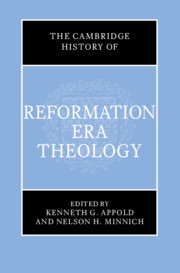Book contents
- The Cambridge History of Reformation-Era Theology
- The Cambridge History of Reformation-Era Theology
- Copyright page
- Contents
- Figures
- Acknowledgments
- Contributors
- Abbreviations
- Introduction
- Part One Theology in an Age of Cultural Transformation
- Part Two Schools and Emerging Cultures of Theology: Diversity and Conformity within Confessions
- 10 The Faculty of Theology of Paris (1474–1682)
- 11 The School of Salamanca
- 12 The Schools of Louvain and Douai: The Bible, Augustine, and Thomas
- 13 The Jesuit School of Theology
- 14 Theological Currents in Latin America (Sixteenth Century)
- 15 Diversity and Conformity within Early Lutheranism
- 16 Reformed Schools of Theology
- 17 Cultures of Theology in the British Isles
- 18 Radical and Dissenting Groups
- 19 Christian Ecumenical Efforts
- 20 Western “Confessions” and Eastern Christianity
- Part Three Topics and Disciplines of Theology
- Index
- References
20 - Western “Confessions” and Eastern Christianity
from Part Two - Schools and Emerging Cultures of Theology: Diversity and Conformity within Confessions
Published online by Cambridge University Press: 27 September 2023
- The Cambridge History of Reformation-Era Theology
- The Cambridge History of Reformation-Era Theology
- Copyright page
- Contents
- Figures
- Acknowledgments
- Contributors
- Abbreviations
- Introduction
- Part One Theology in an Age of Cultural Transformation
- Part Two Schools and Emerging Cultures of Theology: Diversity and Conformity within Confessions
- 10 The Faculty of Theology of Paris (1474–1682)
- 11 The School of Salamanca
- 12 The Schools of Louvain and Douai: The Bible, Augustine, and Thomas
- 13 The Jesuit School of Theology
- 14 Theological Currents in Latin America (Sixteenth Century)
- 15 Diversity and Conformity within Early Lutheranism
- 16 Reformed Schools of Theology
- 17 Cultures of Theology in the British Isles
- 18 Radical and Dissenting Groups
- 19 Christian Ecumenical Efforts
- 20 Western “Confessions” and Eastern Christianity
- Part Three Topics and Disciplines of Theology
- Index
- References
Summary
The notion of “Eastern Christianity” covers an extensive variety of ecclesiastical traditions – Chalcedonian (“Byzantine”/“Melkite”), pre-Chalcedonian (“Miaphysite”/“Jacobite”), and pre-Ephesian (“Nestorian”/“Chaldean”) – that originated in Late Antiquity in the Eastern Roman Empire and neighboring lands. This vast area, including the region surrounding the Mediterranean from the Balkan peninsula through Asia Minor, south Caucasus, upper Mesopotamia, Syria, Palestine, and Egypt, gave birth to a diversity of Christian cultures using Greek, Aramaic, Syriac, Armenian, and Coptic as the languages of their theological and liturgical traditions. Islamic conquests that began in the seventh century brought about an increasing Arabization of Eastern Christian cultures in the territories under Muslim control, but the identity of Eastern Christianity remained clearly bound to its Late Antique origins.
- Type
- Chapter
- Information
- The Cambridge History of Reformation Era Theology , pp. 385 - 402Publisher: Cambridge University PressPrint publication year: 2023

